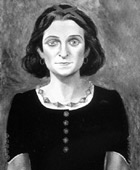Laura Riding Jackson was born Laura Reichenthal on January 16, 1901, in New York City. From 1918 to 1921, she attended Cornell University. In 1920, she married Louis Gottschalk, a professor of history at Cornell. Her work soon attracted the notice of "The Fugitives," a group of writers centered on Vanderbilt University whose members included John Crowe Ransom, Allen Tate, and Robert Penn Warren. The group met regularly to read and discuss poetry and philosophy, and published a poetry magazine, The Fugitive. In 1923 she began calling herself Laura Riding Gottschalk, and her first published poem appeared in The Fugitive; the following year she received the group's "Nashville Prize" for poetry. She was invited to join the group, accepting in March 1925. That same year, Riding and Gottshalk divorced, and she moved to New York City. While in New York, she became friends with various writers, including the poet Hart Crane.
In 1925, Robert Graves invited her to collaborate on a book, and she left New York for England. Riding lived abroad, mainly in England and Mallorca, Spain, from 1926 to 1939. In 1927 she officially changed her name to Laura Riding. That same year, she established the Seizin Press with Graves, serving as managing partner of the press until 1938. She and Graves co-wrote A Survey of Modernist Poetry (1927), and from 1935 to 1938 they edited Epilogue, a journal in which they explored new principles of textual analysis that were to influence the development of the New Criticism.
In 1941, having returned to the United States, Riding married Schuyler Brinckerhoff Jackson, a poet, critic, and former poetry editor of Time magazine. In 1943, they moved to Wabasso, Florida, where they became involved in citrus farming. For many years she worked with her husband on A Dictionary of Related Meanings, a project she had begun in the 1930s. They also collaborated on Rational Meaning: A New Foundation for the Definition of Words, which she completed in 1974, six years after Schuyler Jackson's death. She was honored with the Mark Rothko Appreciation Award in 1971, a Guggenheim fellowship in 1973, a National Endowment for the Arts fellowship in 1979, and, in 1991, Yale University's Bollingen Prize for her lifetime contribution to poetry.
Jackson published collections of short stories and essays under several forms of her name and the pseudonym Madeleine Vara. Her most successful book was Lives of Wives (1939), a work of historical fiction. She completed more than a dozen volumes of poetry before renouncing the craft as "inadequate" in the late 1930s. She continued to write prose, however, releasing The Telling in 1973 and How a Poem Comes to Be in 1980. Jackson died in 1991 in Wabasso, Florida. |






